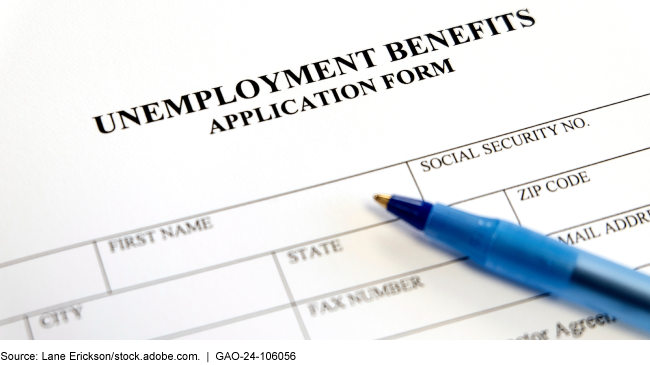Economic Downturns: Effects of Automatic Spending Programs and Taxes
Fast Facts
"Automatic stabilizers" adjust federal spending and taxes during an economic downturn. These budget mechanisms can help keep the economy afloat when unemployment is high and incomes fall.
Our Q&A report documents the effects of automatic stabilizers in recent economic downturns. Specifically, they:
Prevented the economy from getting worse by generating additional economic activity
Helped support people's wellbeing by alleviating poverty and improving nutrition through government benefits like unemployment insurance and food assistance
Contributed to deficits in the wake of recent downturns, but aren't a key driver of unsustainable debt
Unemployment insurance is a type of automatic stabilizer

Highlights
What GAO Found
Studies GAO reviewed showed that automatic stabilizers—mechanisms that alter tax and spending levels in response to changes in economic conditions without direct intervention by policymakers—reduced the detrimental effects of recent economic downturns. Automatic stabilizers include taxes—such as the individual income tax, where taxpayers owe less as their income declines—as well as benefit programs—such as unemployment insurance, where more people become eligible during economic downturns. These automatic stabilizers prevented the economy from getting worse by generating additional economic activity.
Studies showed that during economic downturns, programs with an automatic stabilizer component had various positive effects on the wellbeing of individuals and families, such as alleviating poverty and supporting positive health outcomes such as improved nutrition and healthy birthweights. However, it is difficult to isolate the effects of automatic stabilizers, because studies frequently did not separately analyze the automatic portions of these programs and discretionary changes made by policymakers to address economic downturns.
Automatic stabilizers contributed to federal deficits in the wake of recent economic downturns, according to Congressional Budget Office (CBO) analysis. However, automatic stabilizers are not the key driver of debt over the long-term. Rather, the growth in debt over the long-term results from borrowing to finance increasingly large annual budget deficits, which occur because spending is increasing more than revenue. Over the long term, this spending is driven by increases in Medicare, other federal health care, and Social Security program spending along with increases in interest costs to service the growing debt. We have previously reported that the federal government faces an unsustainable long-term fiscal future. Debt held by the public is expected to exceed its historical high of 106 percent of gross domestic product within the next 10 years.
Why GAO Did This Study
During economic downturns, the federal government can use tax and spending policies to support economic growth and limit the detrimental effects on individuals and families through the use of automatic stabilizers. For example, in an economic downturn—when incomes and the employment level fall—tax liabilities may decrease, and more people may become eligible for certain government benefits, such as unemployment insurance and food assistance. Conversely—when incomes and the employment level rise—tax liabilities may rise, and fewer people may be eligible for government benefits.
GAO was asked to review several issues related to automatic stabilizers. This report examines the effects of automatic stabilizers on the economy, the wellbeing of individuals and families, and the federal government's fiscal condition.
GAO conducted an extensive review of academic and government literature; reviewed data and analysis from CBO, National Bureau of Economic Research, Bureau of Economic Analysis, and the Bureau of Labor Statistics; and spoke with CBO and Federal Reserve staff.
For more information, contact Jeff Arkin at (202) 512-6806 or arkinj@gao.gov.
